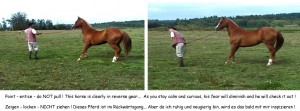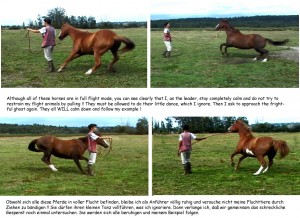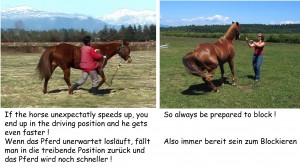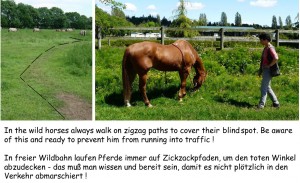Playing – with Knowledge – Part 06
|
|
Fachmännisch spielen – Teil 06
|
| Continued from the last Blog:
Your horse gets too fast:
- What to do, if your horse gets moving nicely, but then doesn’t slow down for you? This tends to happen especially, when you started from the partner position, because then you fall behind the horse´s movement and end up in the driving position, (the lead stallion position), which makes him even faster! So you must anticipate your horse´s next move by sharp observation, and if he tends to take off on you, you must remain in the body blocking position in front of him.
|
|
Fortsetzung des letzten Blogs:
Das Pferd wird zu schnell:
- Was tun, wenn das Pferd zwar zackig losläuft, aber dann nicht auf Sie wartet? Das passiert insbesondere, wenn man sich in der Partnerposition befand und dann hinter die Bewegung kommt und in der „treibenden Position“ endet (die Leithengst Position), so daß das Pferd noch schneller wird! Man muß also seinen Plänen durch scharfes Beobachten zuvorkommen und, wenn es dazu neigt abzuhauen, in der Blockier-Position vor ihm bleiben.
|
|
|
- But even in the partner position you will communicate to him that the idea is total harmony: you move together and you stop together. Until you can be pretty sure of your horse, try to keep him slow at all times. Establish your voice commands and insist that he obeys them. Mine are “easy” or “shshsh”. A sharp “brrr!!!” stops him promptly, even if he just spooked. As long as you are still using the rope you can of course also give him a sharp tug on it, if he doesn’t listen.
- You achieve this goal of harmony by frequent repetition of course, stop him often! Horses love to synchronize with a friend – and grazing together is the best way to become an agreeable friend! In partner position the horse has the right to make suggestions – but he should not think he can just walk off. Sometimes when Beau tries nevertheless, I have to catch him by the tail! Not very elegant, but it is the result that counts!
|
|
- Aber auch in der Partner- Position teilt man ihm mit, daß das Ziel totale Harmonie ist: wir gehen zusammen los und halten zusammen an. Bis man sich seines Pferdes ziemlich sicher sein kann, bleibt man am besten immer langsam. Führen Sie Ihre Stimmkommandos ein und bestehen Sie darauf, daß sie befolgt werden. Meine sind “easy” oder “shshsh”. Ein scharfes “brrr!!!” stoppt es prompt, auch wenn es grade gescheut hat. Solange man das Seil noch anfaßt, kann man natürlich auch einen scharfen Ruck geben, wenn das Pferd einen testet.
- Man erreicht das harmonische Ziel natürlich durch viel Wiederholung – stoppen Sie oft! Pferde synchronisieren sich aber gerne mit ihren Freunden – und zusammen Grasen ist der beste Weg ein angenehmer Freund zu werden! In der Partner Position hat das Pferd das Recht Vorschläge – aber nicht sich selbständig zu machen. Wenn Beau es manchmal dennoch versucht, habe ich ihn auch schon am Schweif angehalten! Nicht so elegant, aber es ist das Resultat, was zählt!
|
|

|
Zigzag:
- As our leading on the slack rope with body language will eventually lead to “free-leading” off-line (unless you graze next to a freeway), remember that a horse has it ingrained in his genes to want to walk on a zigzagging path. He does this to cover his blind spot directly behind him – to be totally aware of happenings all around. He does, however, NOT have ingrained in his genes to look for traffic while doing this! I allow my horses, while grazing (which is our social and fun time together) as much freedom as I can – after all, THEY are the herbivores and not I, and they know better what tastes best! This means that I have to be aware of approaching cars, bicycles and so on, at all times and also recognize, when my horse sets out to cross the road. If the moment is not right, I say “nein!” (Pronounce this like “nine” – we don’t use “no”, because it sounds too much like “Ho!”, which is a very distinct command for us.) I body- block, and of course grab the rope, which is otherwise slung over his back, if necessary.
|
|
Zickzack:
- Da unser Führen am langen Seil und mit Körpersprache am Ende zu „freiem Führen“ ohne Strick führt (es sei denn Sie grasen neben der Autobahn), erinnern Sie sich, daß es ein Pferd in den Genen verankert hat, im Zickzack gehen zu wollen. Das tut es, um den toten Winkel hinter sich abzudecken – um jederzeit alles rundherum im Blick zu haben. Es hat jedoch NICHT in seinen Genen verankert dabei auf den Verkehr zu achten! Während wir grasen, erlaube ich meinen Pferden soviel Freiheit wie möglich, weil es ja unsere gesellige Freizeit ist – außerdem sind sie ja die Grasfresser und wissen besser, was schmeckt und was nicht! Also muß ich immerzu auf sich nähernde Autos, Fahrräder usw. achten und ebenso beobachten, wann mein Pferd zum Straßeüberqueren ansetzt. Wenn der Moment nicht günstig ist, sage ich „nein!“ und Körper-blockiere, und fasse natürlich auch ins Seil, das über seinem Rücken liegt, wenn nötig.
|
|
|
Drive out the ghosts:
- While grazing you have the best opportunity to also “de-spook” your horse (apart from the games mentioned in the book “From Leading to Liberty”). He doesn’t want to go close to garbage cans or a parked tractor? THIS is the spot which you choose for grazing!
- Do not avoid the things he wishes to avoid – you would reinforce his fears. Leave the rope long, let him do his little “but-I-really-don’t-want-to” dance and WAIT. Little by little (and without pulling on him!) you approach closer and praise every little step in the right direction. Your totally relaxed body language shows him there is no reason to worry. If he gets no other choice, he soon WILL be grazing right next to the “ghost”! Now you have made him more courageous AND have confirmed your leadership!
|
|
Treiben Sie die Gespenster aus:
- Während Sie grasen, haben Sie auch die beste Möglichkeit (abgesehen von den Spielen im Buch “From Leading to Liberty”) Ihr Pferd zu „ent-scheuen“. Es will einen weiten Bogen um Mülleimer oder einen geparkten Traktor machen? HIER genau ist der Fleck wo wir grasen!
- Vermeiden Sie nicht die Dinge, die Ihr Pferd vermeiden will – Sie würden so seine Furcht bestätigen. Lassen Sie das Seil lang, lassen Sie es seinen kleinen „ich-will-aber-absolut-nicht“ Tanz vollführen und WARTEN Sie. Ganz langsam (und ohne an ihm zu ziehen!) nähern Sie sich an, und loben bei jedem kleinen Schrittchen in die richtige Richtung. Ihre ganz entspannte Körpersprache ziegt ihm, daß es keinen Grund zur Beunruhigung gibt. Wenn es keine andere Wahl bekommt, WIRD es sehr bald nahe an den „Gespenstern“ grasen! Nun haben Sie ihn mutiger gemacht UND haben Ihre Führeransprüche gefestigt!
|
|

|
What if he spooks?
- We encounter many interesting situations, and in some, the horse might spook. By spooking I mean however that he gets startled and gives a jump, not full out flight. Play as many of the “De-Spooking” Games from the book (“From Leading to Liberty”, chapters 49 to 51) as this increases his self-confidence greatly – and the more confident he is, the less he will jump around!
- Beau spooked when a loose horse approached us in full gallop from behind… also when a stray golf ball (oh these golfers!!) smacked into a tree right in front of him like a shot. Each time he ran a maximum of three steps – he instantly heard my calm but sharp “naNA!” – he looked at me for assessment of the situation: “do we have to flee??” and my body language clearly told him that NO – so he stopped.
- As we can´t fool our horse – he KNOWS when our Adrenalin level goes up! – we have to stay calm as the leader. How to do that will be mentioned in the next Blog about leadership qualities.
|
|
Was tun, wenn es scheut?
- Wir haben schon viele interessante Situationen erlebt, und manchmal scheut das Pferd auch. Scheuen heißt, daß es sich erschreckt und einen Hupfer tut, nicht volle Flucht. Spielen Sie so viele der „Ent-Scheuen“ Spiele aus dem Buch book (“From Leading to Liberty”, Kapitel 49 bis 51) wie möglich, da dies das Selbstvertrauen des Pferdes sehr wirksam erhöht – und je mehr Selbstsicherheit es hat, desto weniger hüpft es rum!
- Beau scheute, als ein flüchtendes Pferd von hinten in vollem Galopp angerannt kam… und einmal, als ein verirrter Golfball (oh diese Golfer!!) wie ein Schuß direkt vor ihm in einen Baum geknallt ist. Jedes Mal rannte er bloß drei Sprünge – hörte sofort mein ruhiges aber scharfes „naNA!“ – guckte zu mir zurück, um die Situation einzuschätzen: „müssen wir flüchten??“ und meine Körpersprache zeigte ihm klar, daß NICHT – also hielt er an.
- Da wir einem Pferd nichts vormachen können – es weiß einfach, wenn unser Adrenalinspiegel ansteigt – müssen wir als Anführer ruhig bleiben. Wie man das lernt beschreibe ich in dem kommenden Blog über Führerqualitäten.
|
|

|
Observe and learn:
- The rest of the time you observe your horse and learn a heap of things about his likes and dislikes! Some horses are greedy and just wolf down whatever is in sight, parked until full. I suspect that those are the horses, who get out very rarely – and they know they have to make the most of it!
- My horses get their grazing time every day and know it and their behaviour varies from day to day. Some days they want to move a lot, some days they park and stuff themselves. Some days are pure clover days, and nothing else will entice them. I should not say “them”, because this varies also from horse to horse, not only from day to day. Other days the dandelions are good – sometimes only the fresh new ones, other times only the tall older ones. Then there are days when all herbs get consumed together at a healthy looking mix. And grass is not like grass! Tall and blooming is sometimes the rage – other times only freshly mown lawn will do…
- I am still always amazed how nimble my horses’ lips are and how they can sort out and nibble around an unwanted buttercup without any problem! I have never seen that any of my horses ever ripped out an unwanted weed – it all gets sorted beforehand. Sometimes the nose just pushes it out of the way, sometimes the lips (and/or tongue) briefly test and then reject it. The only thing, they spit out, are roots of any kind, when they come out of the soft ground, while the horse is trying to rip off the grass or herb.
Time to be social!
- You have an arrangement, where your horse has access to a field and so you don’t have to take him grazing? Well, do it anyway: as you know people can also all drink their beer in solitude at home – but still, they like to go to the pub and pay more for it there! So especially, if your horse has his field alone (how nice! People think… the horse thinks “solitary confinement”, because he is a herd animal!) grazing together is important social time, it is something that friends do together, in harmony and parallel to each other. Alone is just food – together it is food and FUN!
You find this too boring?
- Considering that grazing is THE most important activity to your horse, I would say that you are perhaps not such a good partner and friend to him… though I do admit that I am often also bored to park on the boulevard, day in and day out (I write my notes for the next Blog!). But I certainly have learned a lot about my horses’ likes and dislikes this way – AND I have reinforced my leader position!
- Even off-line and on grass – when I say GO they GO, when I say STOP they STOP! When I say (with my body language): no reason to worry then they will not panic and run – and don’t you think that is useful? One hour of walking together in perfect harmony without a rope and without incidents is quite an art – and is not this harmony what we all profess to strive for?
In the next Playing Blog we will discuss further, how you have to behave to prove to your horse that he can feel safe with you. |
|
Beobachten und lernen Sie:
- Die restliche Zeit ist zum Beobachten da – man lernt eine Menge über die Vorlieben seiner Pferde! Manche sind gierig und verschlingen was immer sie sehen, im Stillstand und bis zum Platzen. Ich denke mal, das sind die, welche selten rauskommen und es voll ausnützen müssen!
- Meine dürfen jeden Tag grasen und wissen es, und ihr Verhalten ist jeden Tag anders. Manche Tage laufen sie viel, manchmal parken sie und futtern nur. Manche Tage sind reine Klee-Tage und nichts anderes interessiert sie. Ich sollte nicht mal „sie“ sagen, denn das ändert sich auch von Pferd zu Pferd, nicht nur von Tag zu Tag. Manche Tage ist der Löwenzahn gut – manchmal der junge, andermal nur die großen alten. Dann gibt es Tage, an denen alles gut gemischt durcheinander gefressen wird. Auch Gras ist nicht gleich Gras! Groß und blühend ist manchmal gefragt, andermal ist nur ein frisch gemähter Rasen appetitlich…
- Ich bin immer wieder verwundert, wie geschickt die Lippen meiner Pferde sind, und wie sie ohne Problem eine unerwünschte Butterblume aussortieren können! Ich habe nie beobachtet, daß eines meiner Pferde eine unerwünschte Pflanze ausgerissen hat – es wird alles vorher sortiert. Manchmal schiebt die Nase es nur beiseite, manchmal kosten die Lippen (oder auch die Zunge) durch kurzes Darüberstreifen und lassen es dann links liegen. Das einzige, was manchmal ausgespuckt werden muß, sind Wurzeln, die aus zu weicher Erde mit ausgezogen wurden, während das Pferd versuchte, das Gras abzurupfen.
Zeit gesellig zu sein!
- Sie haben eine Abmachung, so daß Ihr Pferd auf eine Weide kann und Sie es nicht zum Grasen führen müssen? Tun Sie es trotzdem! Auch Menschen könnten ja all ihr Bier allein zu Hause trinken – und gehen doch in den Pub, wo sie mehr dafür zahlen müssen! Vor allem, wenn Ihr Pferd alleine auf der Weide steht (die Menschen denken „wie schön!“… das Pferd denkt „Einzelhaft!“, da es ein Herdentier ist) ist zusammen Grasen eine ganz wichtige Geselligkeit, etwas das eben Freunde miteinander tun, in Harmonie und parallel zueinander. Allein ist Grasen bloß Futter – zusammen ist es Futter und FUN!
Sie finden es zu langweilig?
- Wenn man bedenkt, daß Grasfressen im Leben Ihres Pferdes DIE wichtigste Aktivität ist, dann sind Sie vielleicht nicht so ein guter Partner und Freund, wie Sie denken… obwohl ich durchaus zugebe, daß ich oft, Tag für Tag da auf dem Boulevard geparkt, an Langeweile leide (ich schreibe Notizen für meinen nächsten Blog!). Aber ich habe jedenfalls auf diese Weise sehr viel über die Vorlieben meiner Pferde gelernt – UND ich habe meine Anführer Position gefestigt!
- Auch ohne Seil und auf Gras – wenn ich „los!“ sage gehen sie los, und wenn ich STOPP sage, halten sie! Wenn ich (mit Körpersprache) sage „kein Grund zur Unruhe!“ dann rennen sie nicht panisch davon – und finden Sie das nicht nützlich? Eine Stunde zusammen in perfekter Harmonie ohne Seil und ohne Zwischenfälle zu verbringen ist eine Kunst – und beteuern wir nicht alle dauernd, daß wir diese Harmonie anstreben?
Im nächsten Blog besprechen wir weiter, wie man sich verhalten muß, um seinem Pferd zu beweisen, daß es sich mit uns sicher fühlen kann. |






